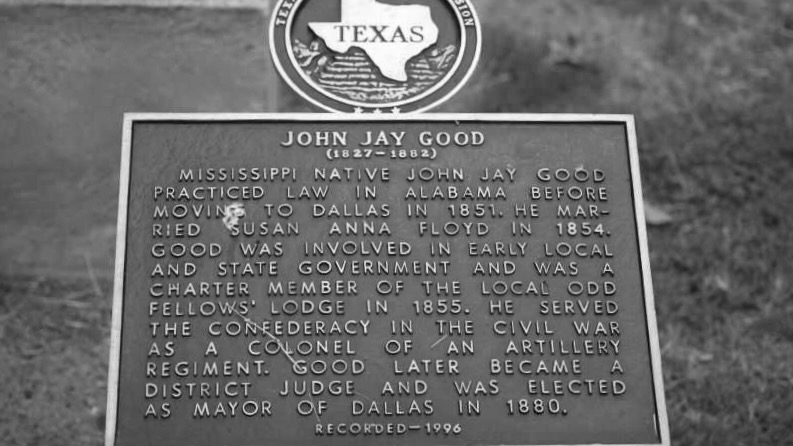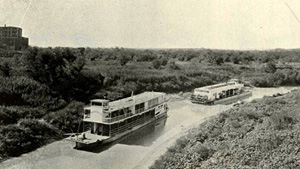
Transcribed from the Dallas Weekly Herald (Dallas, Texas), September 21, 1882
Death of Judge J. J. Good
The melancholy tidings of the death of JUDGE GOOD were received here yesterday forenoon, and whilst none were surprised at the announcement, all were somewhat shocked by the suddenness of the event. He died on the night of the 17th, at El Paso, en route for California, whether he was traveling in search of that departing health, without which life is a burden. It is but simple truth to say that his death has left a vacuum which it will be difficult to fill. Who can take his place or how shall his loss be repaired? JUDGE GOOD was born in Columbus, Miss., where he was educated, and afterwards received his law diploma and license at Lebanon, Tenn. He removed to this county in 1851, since which time Dallas has been his home. At the breaking out of the civil war he took a battery to the front with which his name was always associated. After gallant service he was selected as president of the court-martial, a military court of the army of Tennessee, in which position he continued until the end of the war. JUDGE GOOD was the recipient of many honors from the people among whom he lived and whose respect and admiration he had secured. At the time of SHERIDAN’S high-handed reconstruction the Judge was an “impediment” as district judge of this district. He went with many other good and true men into temporary retirement, only, however, to recruit strength and power to assist in the downfall of Texas tyranny. After the restoration of peace JUDGE GOOD settled down quietly to the conduct of his large and lucrative practice. In 1880 he was nominated for mayor of Dallas whilst absent from home and was elected by the most flattering vote ever given a candidate for that position. JUDGE GOOD was not only a good citizen, lawyer and pre-eminent Mason, but was blessed with a charity as broad as the universe. Many a distressed and impoverished family will miss the unobtrusive benevolence of JOHN J. GOOD. The widow and orphan he seemed to consider his special charges, and although he leaves an ample competency for those whom it was his immediate duty to maintain, yet the bright and practical benevolence of his nature alone prevented the accumulation of much more of earthly wealth than the estate he has left them. As a father he was indulgent and devoted; as husband, loving, tender and provident; as a lawyer, in the very foremost ranks; as citizen, possessed of the confidence of the entire community; as a mason, by (text missing) choice first in the state. But the most marked trait of this manly character was his high sense of honor, his unapproachable integrity. Truly was “his word as good as his bond” – never was heart freer from treachery, nor lips of falsehood’s pollution, than those of JOHN JAY GOOD. …
Transcribed from the Tri Weekly Herald (Dallas, Texas), September 23, 1882
Funeral of Judge Good
The Dallas Herald of the 21st gives a full account of the funeral services for the late Judge John J. Good, from which we take the following. It will be of interest to many of our city who knew him:
Yesterday afternoon one of the largest, if not the largest, funeral cortege ever known in this section of the State followed to their last resting place, at the Masonic burial ground, at the “old cemetery,” all that remained of “one of the noblest men that ever lived in the tide of time,” John J. Good, the beloved citizen, the esteemed official and the pure and upright gentleman. Promptly at the hour designated, the various orders and companies of which the deceased had been in the past an honored and efficient member and officer, assembled in front of the Masonic hall, in the Herald building.
Convened at their respective halls, the lodges, associations, etc. passed appropriate resolutions and went through the duly prescribed exercises for such sad occasions. The eminent Grand Commandery of the State opened at 2:30 o’clock, as did also Tannehill lodge, No. 52 of Masons. The I.O.O.F., at their hall, did the same. The Texas Bar Association in the morning met and consummated similar action.
AT THE RESIDENCE the solumn and impressive rites were had under the Masonic forms provided, a large concourse of persons, friends and relatives of the family, being present upon the sad occasion. The body, which seemed to be in a state of perfect preservation, and the very picture of natural and
SWEET REPOSE rested in an elegant casket. On the lid were wreaths of white flowers and appropriate floral designs. To one of these was attached a card “with the compliments of A. E. Allpart, manager of the Central hotel, El Paso, Texas.” The obsequies ended, the casket was borne to the hearse by the following pall bearers, selected from the various organizations: A. A. Johnson, J. K. Ashby, W. M. C. Hill, Henry Boll, Thomas Walker and H. S. Ervay.
The cortege had scarcely gotten under way when a slight rain commenced falling and so continued to the close. Arrived
AT THE MASONIC BURIAL GROUND, the final ceremonies were had by Sir Knights Eminent Grand Commander Elgin and Eminent Grand Prelate Chaplin. Then came the dull thud of “earth to earth and dust to dust,” as one by one of the shovelfuls of dirt were cast upon the now lowered form of the illustrious departed. Then back to the homes of sorrow went the bereaved family and stricken friends, the last of friendship’s duty done, the last of farewells taken.
During the day the fire bell tolled at intervals its mournful dirge, while draped in deploring tokens were the several engine houses, etc. East Dallas’ steam fire engine appeared with black badges bearing mottoes: “East Dallas Engine No. 2 Mourns Her Loss,” and “In Memory of Our First President.”
Judge Good, besides his devoted wife, left two grown sons, and a daughter just budding into womanhood, and two sons and two daughters yet little children. To all these his death falls with a force proportionate to his admirable and acknowledged tenderness as husband and father, and to them the Herald proffers its sincerest condolence. His
CHIEF CHARACTERISTICS, only fully understood by those enjoying his intimate acquaintance, were, a high sense of personal honor, from which no inducement could swerve him; a sincerity in his friendship worthy of all praise; a scornful disrelish for every species of deception or trickery, and a steadfastness of purpose in all that engaged his mind. Perhaps few men felt and in his own way manifested – his way being strictly private – a heartfelt sympathy with the struggling mass of laboring people. In this his nature was noble, and yet so fastidious were his notions of propriety, that few knew its force.
Get future posts by email.


